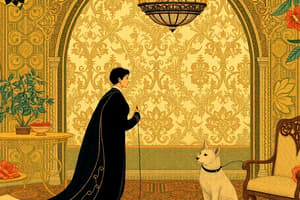Podcast
Questions and Answers
Which factor primarily contributed to the sense of insecurity felt by Americans after World War I?
Which factor primarily contributed to the sense of insecurity felt by Americans after World War I?
- Belief that they were no longer invulnerable to war or political instability. (correct)
- Increased reliance on foreign trade and economic policies.
- Strict enforcement of prohibition, leading to widespread social unrest.
- Rapid advancements in technology outpaced societal adaptation.
How did the mass production of automobiles impact American society during the Jazz Age?
How did the mass production of automobiles impact American society during the Jazz Age?
- It increased dependence on public transportation due to affordable fares.
- It created new jobs and provided a new form of transportation, increasing freedom and ease of travel. (correct)
- It decreased economic activity due to the high cost of car ownership.
- It led to increased urbanization as people migrated to cities for manufacturing jobs.
Which of the following best characterizes the 'flapper' image of the Jazz Age?
Which of the following best characterizes the 'flapper' image of the Jazz Age?
- Intellectual women focused on obtaining higher education and professional careers.
- Rebellious women known for short hairstyles, mini dresses, and enjoying an unconventional lifestyle. (correct)
- Conservative women who adhered to traditional social norms.
- Rural women who maintained a strong connection to agricultural traditions.
How did the ratification of the Nineteenth Amendment influence the role of women in the 1920s?
How did the ratification of the Nineteenth Amendment influence the role of women in the 1920s?
What role did radio and movies play in shaping culture and trends during the Jazz Age?
What role did radio and movies play in shaping culture and trends during the Jazz Age?
What was the primary impact of the Eighteenth Amendment (Prohibition) on American society in the 1920s?
What was the primary impact of the Eighteenth Amendment (Prohibition) on American society in the 1920s?
How did speakeasies contribute to the social and cultural landscape of the Jazz Age?
How did speakeasies contribute to the social and cultural landscape of the Jazz Age?
What event marked the end of the Jazz Age and the beginning of a new era in American history?
What event marked the end of the Jazz Age and the beginning of a new era in American history?
Which of the following factors contributed to the widespread joblessness, poverty, and despair that followed the end of the Jazz Age?
Which of the following factors contributed to the widespread joblessness, poverty, and despair that followed the end of the Jazz Age?
How did the Jazz Age contrast with the period that followed it?
How did the Jazz Age contrast with the period that followed it?
Flashcards
The Jazz Age
The Jazz Age
A period of prosperity, change, and uncertainty between World War I and the Stock Market Crash of 1929.
Flapper
Flapper
A young woman in the 1920s who defied traditional social norms with short hair, dresses, and rebellious behavior.
Speakeasies
Speakeasies
Illegal bars during Prohibition, where people secretly drank alcohol.
The Jazz Singer
The Jazz Singer
Signup and view all the flashcards
Prohibition
Prohibition
Signup and view all the flashcards
Stock Market Crash of 1929
Stock Market Crash of 1929
Signup and view all the flashcards
Radio
Radio
Signup and view all the flashcards
Silent Films
Silent Films
Signup and view all the flashcards
Study Notes
- The Jazz Age, a term coined by F. Scott Fitzgerald, was a period marked by prosperity, advancement, change, and uncertainty.
Jazz Age Symbols
- Symbolized by the first automobiles, radios, prohibition, "flappers," gangsters, "talkies" (movies with sound), "The Charleston," and jazz.
- It spanned from the end of World War I to the Stock Market Crash in 1929, leading to the Great Depression.
- It was considered a decade-long party for some.
Post-World War I America
- Americans experienced dramatic change, losing a sense of invulnerability to war and political instability.
- The U.S. economy shifted from wartime to peacetime, introducing new consumer goods and inventions.
- Henry Ford's mass production of automobiles created jobs and provided freedom and ease of travel.
Trends and Fashion of the 1920s
- Trends and fashion were prominent, with the ratification of the Nineteenth Amendment granting women the right to vote.
- Women felt a new sense of freedom and acceptance, leading to the rise of the "flapper."
- Flappers were known for boyish short bob hairstyles, tight mini dresses with fringe, and bright red lipstick.
- Society admired the "it" girl, who enjoyed alcoholic beverages, smoked, and danced until morning, contrasting with the more "feminine" ladies of the prior era.
- New fashion trends were popularized through radio and movies.
Popularization of Media
- Radio brought families together nightly, broadcasting music, news, drama, comedy, church events, farm news, stock market reports, variety shows, and sports events.
- By 1922, over 500 radio stations existed.
- Movies (silent films) rose to popularity, turning actors like Mary Pickford and Douglas Fairbanks, Sr. into celebrities.
- In 1927, The Jazz Singer, the first movie with sound, was released.
- Stars such as Greta Garbo, Clara Bow, and Rudolph Valentino became household names, making going to the movies a favorite activity.
Rise of the American Gangster
- The 1920s saw a rise in American gangsters like Al Capone, Charles "Lucky" Luciano, John Dillinger, and Bugsy Siegel.
- The Eighteenth Amendment, which prohibited alcohol manufacturing, sales, and consumption, led to gangsters controlling the black market for alcohol.
- Speakeasies, underground bars and gambling halls, became common, increasing the power, wealth, and fame of gangsters.
- In 1929, the Stock Market crashed, leading to the Great Depression and ending the turbulent yet exciting 1920s.
- Americans faced joblessness, poverty, and despair, contrasting with the optimism of the previous decade.
Studying That Suits You
Use AI to generate personalized quizzes and flashcards to suit your learning preferences.




